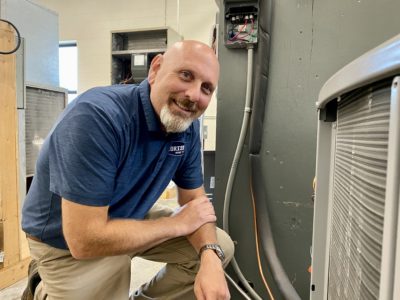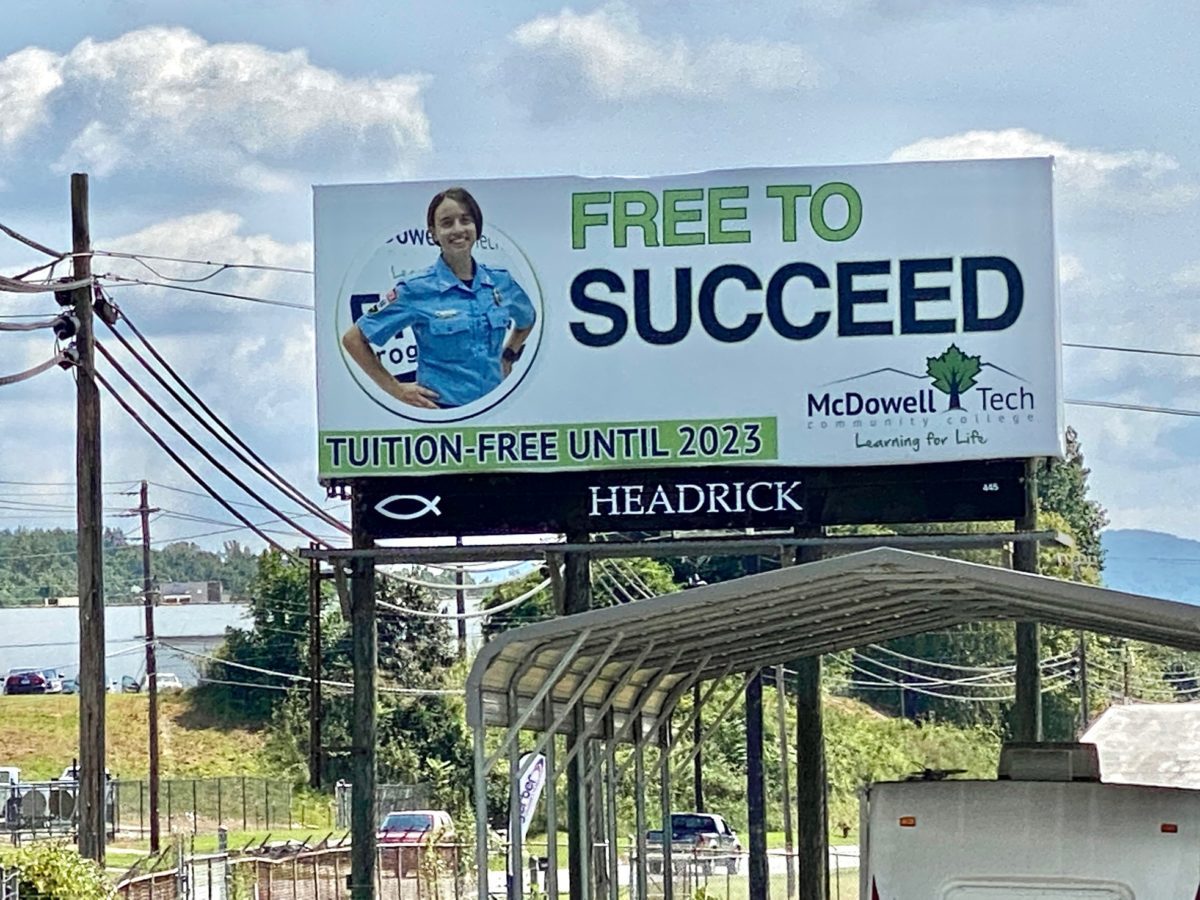
Share this story
McDowell Technical Community College has an annual economic impact of $67.8 million, including $12 million in operations spending, $1.1 million in student spending, and $54.7 million in alumni impact.
Billboards around the county that say “tuition free until 2023” tell you even more about the impact of this community college, and they are catching the eye of students and workers who want to “learn and grow,” the hashtag of the college’s new strategic plan.
Brian Merritt started as president in January 2021, and he quickly led a strategic planning process to guide the growth of McDowell Tech from 2021-25.
The plan states that the community college “is critical to economic mobility for citizens in McDowell County and western North Carolina.”
Using federal relief funds to pay for tuition and fees
Even before the strategic plan was adopted in June 2021, Merritt had an opportunity to move into implementation.
Goal 1 of the strategic plan is access: “We will expand learning opportunities and remove barriers to enrollment.”
On May 25, 2021, McDowell Tech announced the Learn and Grow Scholarship Program, which according to the press release, “effectively eliminates one of the most significant barriers to college attendance: cost.”
For academic years 2021-22 and 2022-23, this community college is offering free tuition and fees for current, returning, and new curriculum students taking at least six credit hours. It is also offering free tuition and fees for these workforce training classes:
- Basic Law Enforcement Training
- Construction Trades
- Cosmetology
- Esthetics
- Healthcare Billing & Coding
- Industrial Maintenance
- Machining Fundamentals
- Nurse Aide I (8 week course)
- Paramedic/EMT
- Phlebotomy
This is what is known as a “last dollar” scholarship. Once students apply, the financial aid office determines if the student is eligible for other sources of funding first, including the NC Longleaf Commitment, before using federal relief dollars to close the gap.
According to the website, this funding was “made available to MTCC and other colleges by Congress under Section 18004(a)(2) of the Education Stabilization Fund of the Coronavirus Aid, Relief, and Economic Security (“CARES”) Act.” See question six of this FAQ, which authorizes the investment. At the end of 2021-22, students who benefited from the program received an average of $516 in aid, according to Merritt.
“We dedicated our relief funds to student scholarships,” said Merritt. “We had an opportunity to invest in our students, and we took that seriously, and it’s paid off.”
Enrollment is up 18% for total FTE (full-time equivalent students) and 12.7% for curriculum FTE. And that’s important in a county where the college-going culture is just taking hold.
According to myFutureNC, “Overall, 4% of 25-44-year-olds in McDowell County have earned a master’s degree or higher as their highest degree; 13% have a bachelor’s degree; 15% have an associate degree; 26% have some college, no degree; 29% have a high school diploma; and 13% have less than a high school diploma.”
Merritt said there are 25,000 adults in McDowell County with no degree, and unemployment is two times higher for Latinx workers, three times higher for Black workers, and four times higher for biracial workers.
The leadership team said the investment in free tuition was Merritt’s “brainchild.”
“We are totally student focused,” said Beverly Watts, dean of student success. “We will do whatever it takes to help the students be successful.”
Meet Auburn Nanney
Auburn Nanney is a first generation college-going student. She graduated from McDowell Tech debt free thanks in part to the Learn and Grow Scholarship.
While Nanney was attending McDowell Tech, she was coping with a congenital birth defect that required surgery, and as a single mom, she was also coping with schools being closed during COVID-19.
And yet she graduated with a 4.0 and landed a job as an agent with the Jeff Kincaide Insurance Group. She leads in the community through the Marion Rotary Club and aspires to be a county commissioner.
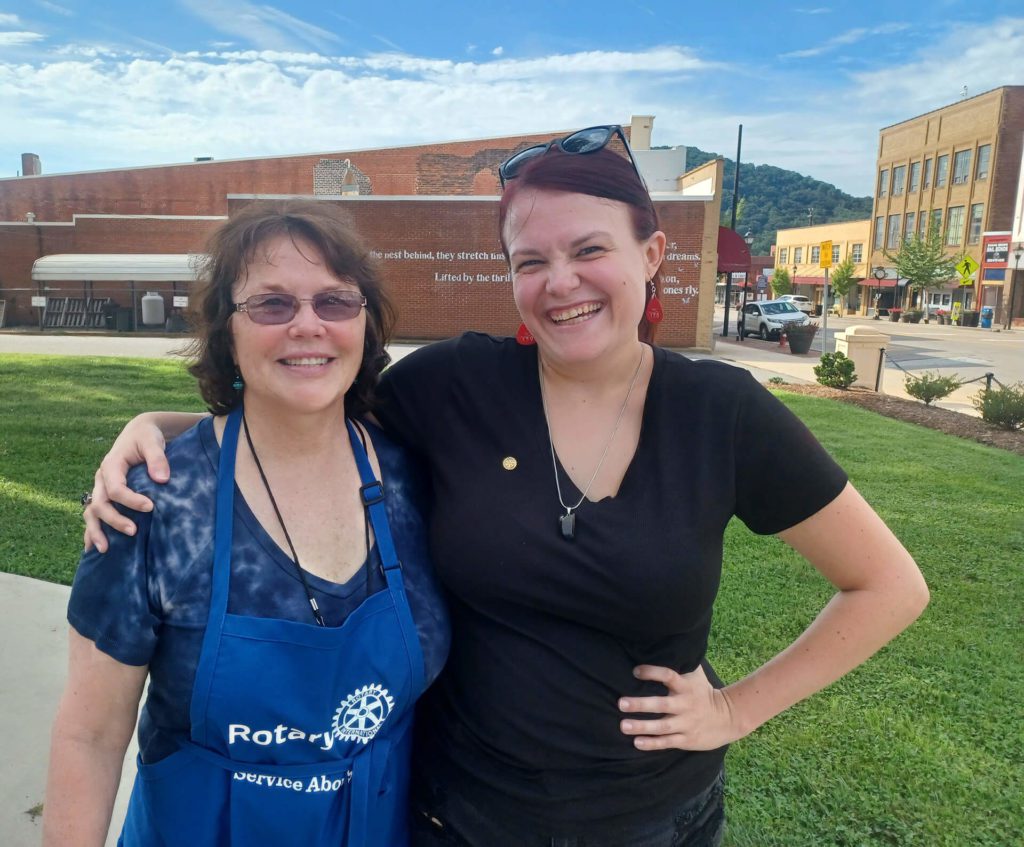
Nanney told Merritt, “I just want to let you know that you all have done more for poor people in this county in the last year than has ever been done.”
Meet Rickey Green
Rickey Green is a student in McDowell Tech’s Construction Trades Academy. It takes 16 weeks to complete the academy, and the class meets for five hours a day, five days a week. It is a fast track into employment.
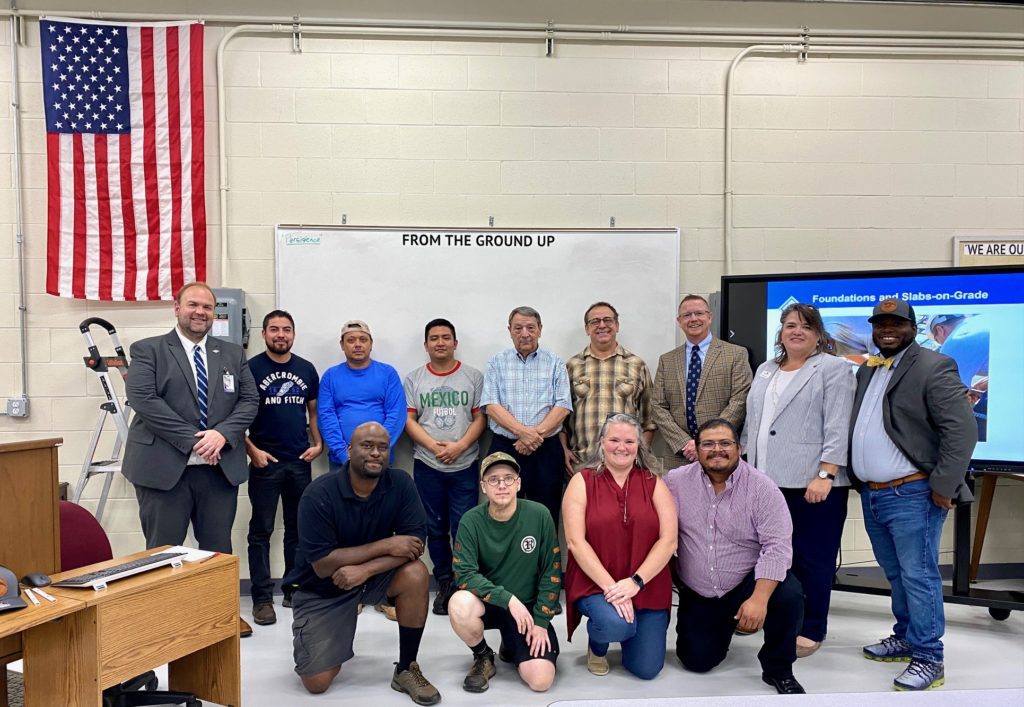
The academy works in partnership with Gateway Wellness Foundation to build local housing that is supported by philanthropic investments.
A press release from Dogwood Health Trust says, “The new housing complex will be located alongside the campus of McDowell Technical Community College in Marion and will provide 168 units through one, two and three-bedroom options, serving residents at 80 -120% of the average Area Median Income (AMI). The project is expected to generate nearly $20 million in economic activity, while utilizing local vendors, suppliers and trades both during construction and afterwards for ongoing property management.”
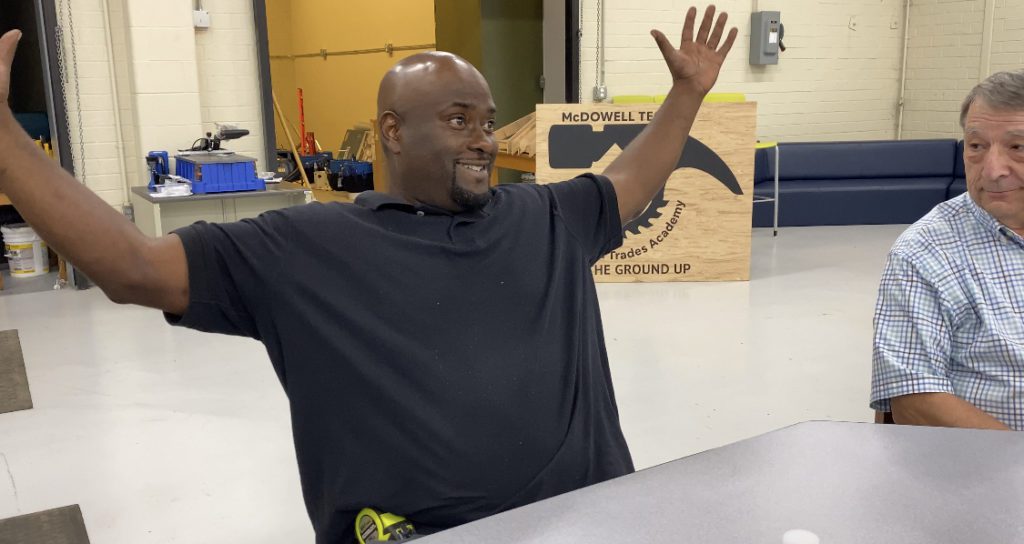
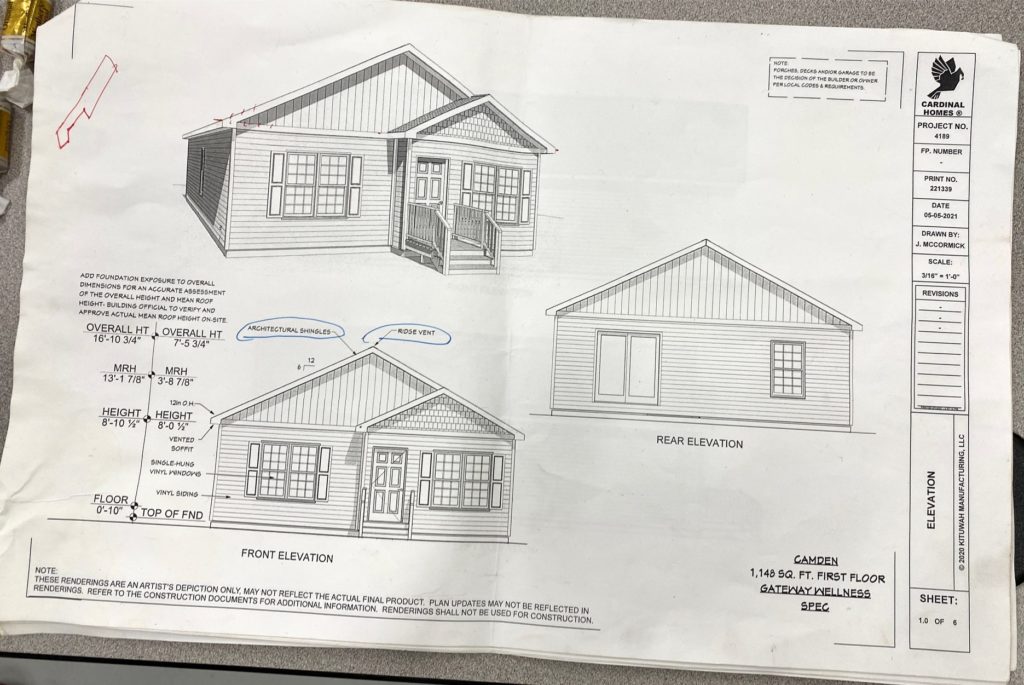
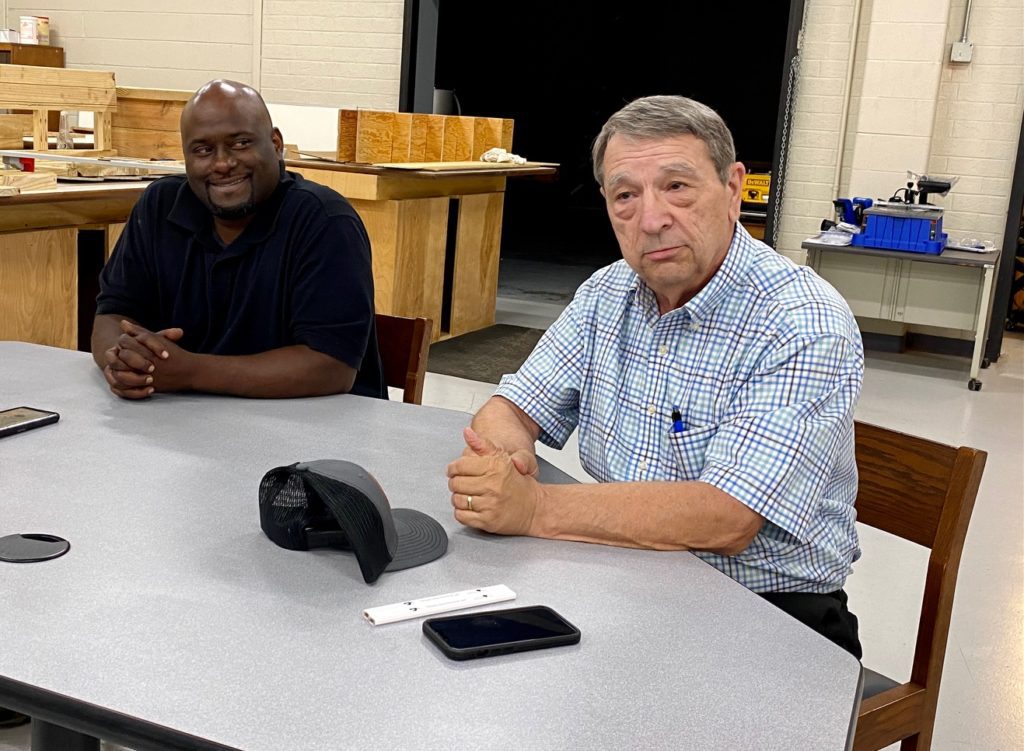
Green had experience in construction, but he said the academy is addressing “the gaps in what I thought I knew.” Through the course, Green is learning about the new technology in the construction trades — including virtual reality — and the terminology used on job sites. He hopes to do project management in the future.
“It’s a blessing for me to be here,” said Green.
Donald Ramsey, a member of the board of trustees of the community college, took the course himself and now works with students and Gateway Wellness Foundation. Speaking about Ramsey, Green said, “he sees something in me.”
“I couldn’t want for more,” said Green. “I have a great instructor. I have a great mentor. There’s support everywhere.”
Stacy Buff, associate vice president for workforce development, said, “The training is short-term. Tuition and books are initially free, there is part-time, paid employment while you’re in school — if you choose to participate — and employers are clamoring to hire graduates with this kind of training. It’s a win-win for our community.”
The academy includes Integrated English Literacy and Civics Education (IELCE), which provides civics education and English-language learning tailored to the occupational training and workforce preparation.
A better life
McDowell Tech conducted research in the communities they serve to uncover and discover how people think about careers and career pathways.
It turns out the word career sounds unattainable to many, and career pathways are unclear to most.
People want jobs. Sometimes they need new skills to change industries. They want to understand how much different jobs pay. They want to provide for their families. They would like to pursue their interests and passions through work. They want a better life.
The research found that all groups surveyed said free tuition or scholarships would make it easier to enroll. That’s when the community college put up the billboards.
“The success of Auburn and Rickey in the classroom and the workplace,” said Merritt, “is proof positive that community colleges are North Carolina’s workforce engine and the key to upward economic and social mobility.”


